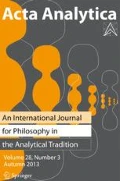
Notes
See Mechior (2019), pp. 30–41. On page 30, Melchior simply leaves condition (2) as “M is an appropriate method with respect to p”, explaining later that what it takes to be appropriate is to be a sensitive method, the condition (2) that I have supplied here.
See Nozick (1981), p. 179.
See Sosa (1999), pp. 145–146.
See Melchior (2019), p. 3.
Ibid, p. 215.
Ibid, p. 142.
This case, originally detailed by Dretske (1970), is adapted by Melchior (2019), p. 159.
Melchior also uses KSAC to explain paradoxes involving stakes (p. 150) and bootstrapping (p. 193). Because these solutions are all similar in spirit to Melchior’s explanation of the skeptical paradox, my points in the rest of this paper can be applied to these other paradoxes as well.
See Melchior (2019), p. 145.
See Wieland (2014).
Those who argue that knowledge is the aim of inquiry include Hannon (2019); Kappel (2010); Kelp (2011), (2014), (2021a), and (2021b); Kvanvig (2009); Millar (2011); Rysiew (2012); Sartwell (1991) and (1992); Whitcomb (2017); and van Elswyk and Sapir (2021), amongst others.
Those who point out the tension between knowing and continuing to inquire include Armour (2011), p. 673; Fantl (2018), p. 142; Fantl and McGrath (2012) and (2014); Friedman (2013), (2017), (2019a), and (2019b); and van Elswyk and Sapir (2021).
See Friedman (2013), (2017), (2019a), and (2019b).
For authors who defend versions of the Ignorance Norm, see Friedman (2017) and (2019b), van Elswyk and Sapir (2021), and Whitcomb (2017), amongst others.
See Friedman (2019b), p. 303.
See Armour-Garb (2011), p. 670; Hawthorne and Stanley (2008), p. 587; Friedman (2017), p. 131; and Friedman (2019a), p. 86.
Against the Ignorance Norm, Falbo (2021) argues that confirming that p is compatible with knowing that p, and Woodard (Forthcoming) defends the rationality of double checking while knowing.
For those who defend cases like these, see Falbo (Forthcoming) and Woodard (2022) and (Forthcoming).
For this suggestion, that the infelicity of (1)–(3) can be explained by the fact that knowledge is the most common aim of inquiry, see Woodard (Forthcoming).
See Melchior (2019), p. 144.
References
Armour-Garb, B. (2011). Contextualism Without Pragmatic Encroachment. Analysis, 71, 667–676.
Dretske, F. (1970). Epistemic Operators. Journal of Philosophy, 67, 1007–1023.
Falbo, A. (2021). Inquiry and Confirmation. Analysis, 81, 622–631.
Falbo, A. (Forthcoming). Inquiring Minds Want to Improve. Australasian Journal of Philosophy
Fantl, J. (2018). The Limitations of the Open Mind. Oxford University Press.
Fantl, J., & McGrath, M. (2012). Pragmatic Encroachment: It’s Not Just About Knowledge. Episteme, 9, 27–42.
Fantl, J., & McGrath, M. (2014). Practical Matters Affect Whether You Know. In M. Steup & E. Sosa (Eds.), Contemporary Debates in Epistemology (pp. 84–94). Blackwell.
Friedman, J. (2013). Question-Directed Attitudes. Philosophical Perspectives, 27, 145–174.
Friedman, J. (2017). Why Suspend Judging? Nous, 51, 302–326.
Friedman, J. (2019). Checking Again. Philosophical Issues, 29, 84–96.
Friedman, J. (2019). Inquiry and Belief. Nous, 53, 296–315.
Hannon, M. (2019). Skepticism: Impractical Therefore Implausible. Philosophical Issues, 29, 143–158.
Kappel, K. (2010). On Saying that Someone Knows: Themes from Craig. In A. Millar, A. Haddock, & D. Pritchard (Eds.), Social Epistemology. Oxford University Press.
Kelp, C. (2011). What’s the Point of ‘Knowledge’ Anyway? Episteme, 8, 53–66.
Kelp, C. (2014). Two for the Knowledge Goal of Inquiry. American Philosophical Quarterly, 51, 227–232.
Kelp, C. (2021). Inquiry, Knowledge, and Understanding. Oxford University Press.
Kelp, C. (2021). Theory of Inquiry. Philosophy and Phenomenological Research, 103, 359–384.
Kvanvig, J. (2009). The Value of Understanding. In A. Haddock, A. Millar, & D. Pritchard (Eds.), Epistemic Value. Oxford University Press.
Mates, B. (1996). The Skeptic Way: Sextus Empiricus’ Outlines of Pyrrhonism. Cambridge University Press.
McGrath, M. (2021). Being Neutral: Agnosticism, Inquiry and the Suspension of Judgment. Nous, 55, 463–484.
Millson, J. (2020). Seeking Confirmation: A Puzzle for Norms of Inquiry. Analysis, 80(4), 683–693.
Millar, A. (2015). Why Knowledge Matters. Proceedings of the Aristotelian Society, 85, 63–81.
Melchior, G. (2019). Knowing and checking: An Epistemological Investigation. Routledge.
Rysiew, P. (2012). Epistemic Scorekeeping. In J. B. M. Gerken (Ed.), Knowledge Ascriptions. Oxford University Press.
Sartwell, Crispin. (1991). Knowledge is Merely True Belief. American Philosophical Quarterly, 28, 157–165.
Sartwell, Crispin. (1992). Why Knowledge is Merely True Belief. Journal of Philosophy, 89, 167–180.
Sosa, E. (1999). How to Defeat Opposition to Moore. Philosophical Perspectives, 13, 141–153.
Sextus Empiricus., (2000). Outlines of Scepticism. Translated by Julia Annas and Jonathan Barnes. Cambridge University Press.
van Elswyk, P., & Sapir, Y. (2021). Hedging and the Ignorance Norm on Inquiry. Synthese, 199(3), 5837–5859.
Whitcomb, D. (2017). One Kind of Asking. Philosophical Quarterly, 67, 148–168.
Wieland, J. (2014). Sceptical Rationality. Analytic. Philosophy, 55, 222–238.
Woodard, E. (2022). The Ignorance Norm and Paradoxical Assertions. Philosophical Topics, 49(2), 321–322.
Woodard, E. (Forthcoming). Why Double Check. Episteme
Author information
Authors and Affiliations
Corresponding author
Ethics declarations
Conflict of Interest
The author declares no competing interests.
Additional information
Publisher’s Note
Springer Nature remains neutral with regard to jurisdictional claims in published maps and institutional affiliations.
Rights and permissions
About this article
Cite this article
Siscoe, R.W. Checking and the Argument from Inquiry. Acta Anal 38, 69–78 (2023). https://doi.org/10.1007/s12136-022-00532-1
Received:
Accepted:
Published:
Issue Date:
DOI: https://doi.org/10.1007/s12136-022-00532-1

